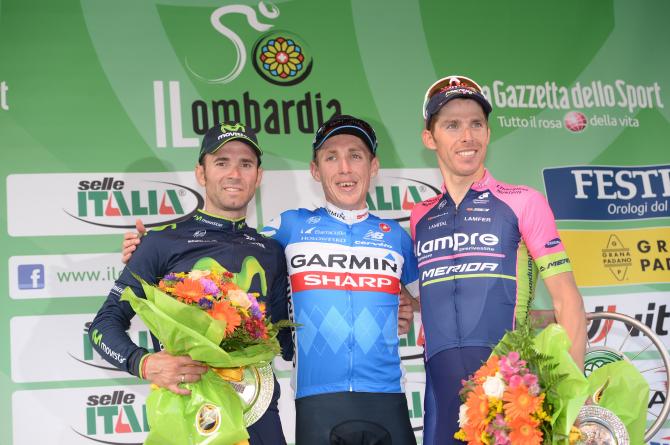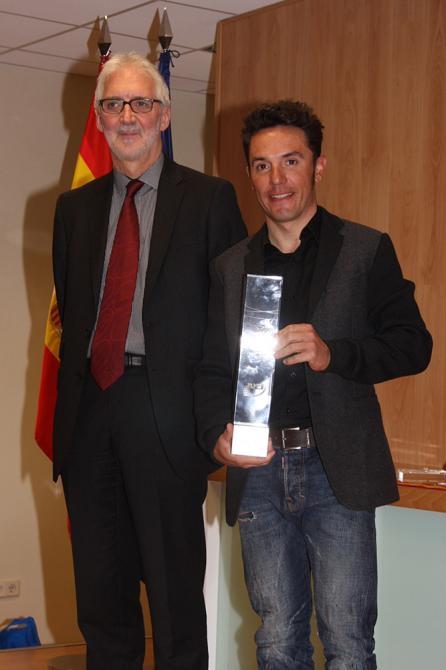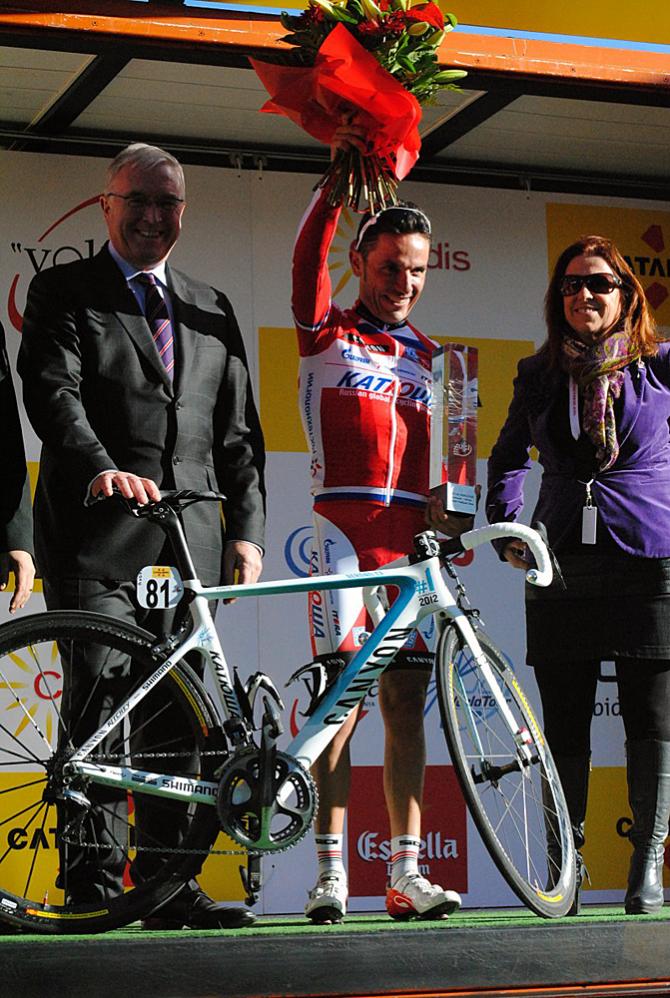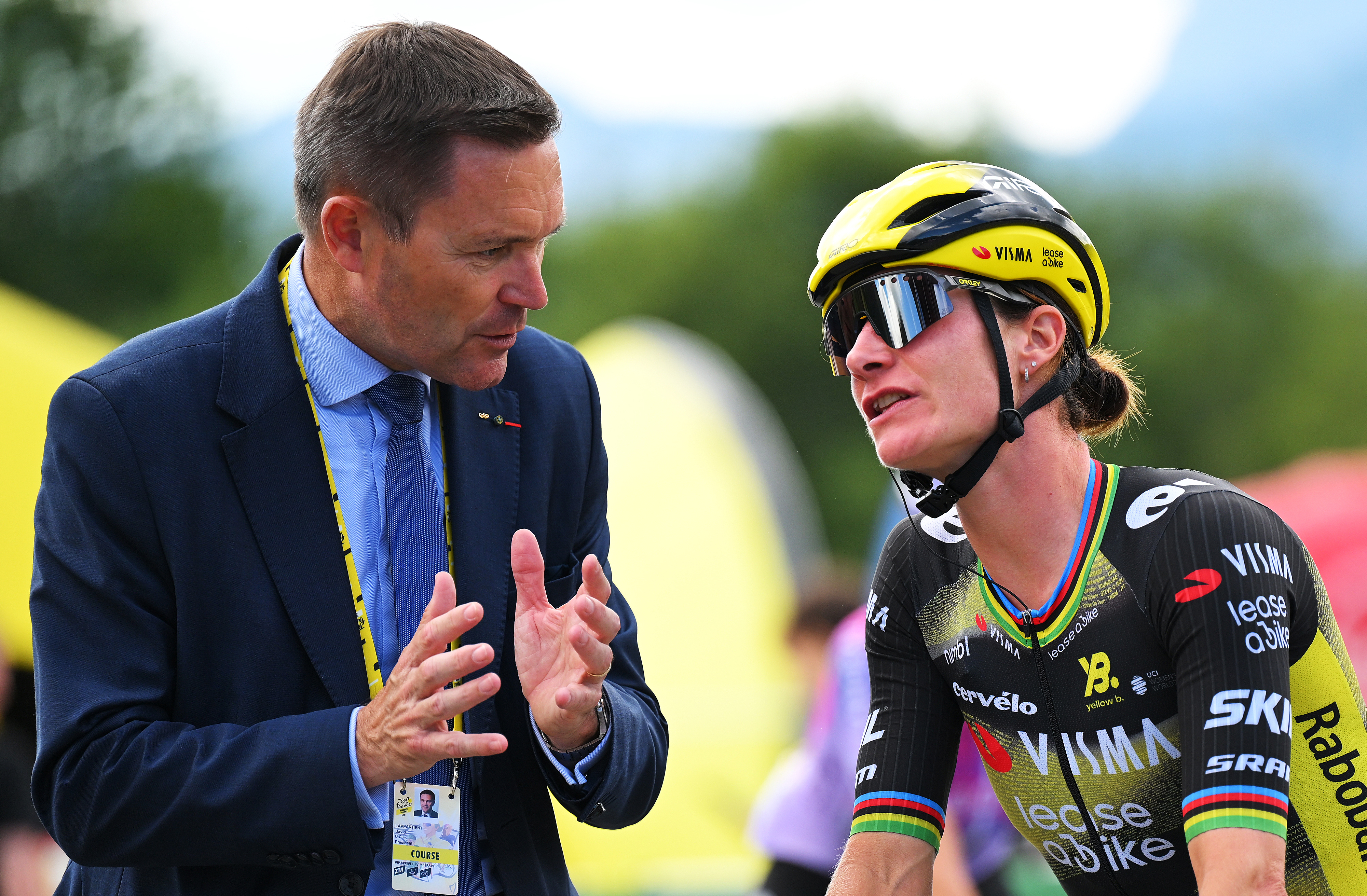Opinion: The UCI WorldTour is a failing brand
Broader proposals needed to help cycling grow
The latest race content, interviews, features, reviews and expert buying guides, direct to your inbox!
You are now subscribed
Your newsletter sign-up was successful



Oleg Tinkov was onto something with his Grand Tour Triple Challenge idea, but he was barking up the wrong tree. In the short term, Tinkoff-Saxo, Movistar, Astana and Team Sky would be better advised to race the likes of Contador, Quintana, Nibali and Froome together in non-Grand Tour events. These are the teams and riders that pull in the audiences, so this tactic would be an effective means to build commercial leverage versus the Grand Tour organisers and the UCI, and, more importantly, begin to build a bigger and better sport for more to share in.
In this context Christian Prudhomme should be applauded for his egalitarian point of view: “For me, it’s important that the biggest riders are in the biggest races but that doesn’t necessarily mean the three Grand Tours. It means the big rendezvous throughout the season, which in other eras the likes of Eddy Merckx and Bernard Hinault used to take part in. We want the best riders in the world there from the start of the year to the end, so that there’s a real narrative with all of the champions together throughout the season from one race to the next. That’s the most important thing, and more important than having them ride the three Grand Tours in one year.”
But this vision would be better coming from the UCI, the custodians of the UCI WorldTour. In sport, a whole that is greater than the sum of it parts is a maxim best applied to the likes of the English Premier League, the NFL and Formula 1. It can’t be applied to the UCI WorldTour; a stagnating brand over shadowed by its constituent events and teams. The pro cycling calendar is still dominated by the Tour de France (an incredible event but generating (€120m direct revenues per annum) and in the big scheme of things how many sports fans and sponsors are aware of the UCI World Tour brand? Answer: not nearly enough.
This situation came to a head in early October when the UCI announced only 17 applicant teams for 18 available World Tour licences. This under demand at the top level of cycling is embarrassing for the sport and is perhaps the best illustration of a governing body that struggles to make sense of the market forces available to cycling. On one hand, the UCI needs to use the WorldTour brand to generate direct revenues. On the other hand, it should use the UCI WorldTour to facilitate a bigger and better sport for all other stakeholders. At the moment it doesn’t do either very well.
The final details of a reform plan for the World Tour (2015-17) will be shared with stakeholders at the UCI’s WorldTour Seminar in December. We already know the key themes:
• Fewer WorldTour race days (from 150+ to c120)
• No overlap in World Tour events
• Fewer WorldTour teams (from 18 to 16) and riders (from 30-22)
• A 1b division between WorldTour (1a) and Pro Conti level, consisting of 8 teams who are permitted to race c50 days of the WorldTour
This is a good start. Reducing supply (teams, race days, riders) should begin to stimulate short-term commercial demand at the top level of the sport and help to push any excess downwards, through other divisions. However, the UCI should be bolder and entrepreneurial with its rights, if it is to mitigate the threat of breakaway league reprisals. After all, what value does the UCI currently deliver to events and teams? IAM Cycling are a good example. They don’t feel compelled to be a WorldTour team, as they can realistically expect to be a wildcard invite to the 2015 Tour de France. Job done.
The latest race content, interviews, features, reviews and expert buying guides, direct to your inbox!
The writing is on the wall, if the Avignon teams where to use private equity to buy, create or licence the rights of existing events (i.e. RCS, Flanders Classics, SweetSpot), it would become a powerful rights holder (controlling rider talent and TV audiences), alongside the ASO. In this scenario, would the UCI WorldTour be relevant or meaningful?
So, in advance of December’s World Tour Seminar what other means does the UCI have to build a stronger WorldTour brand and controlling interest in the sport?
Nuclear Option - Reengineering the World Championships
The World Championships are steeped in history, romance & prestige. However, the rainbow bands, awarded in their current format, get in the way of promoting the season as a whole and celebrating the top performers of the UCI WorldTour. These are rights the UCI could be more adventurous with.
Nowadays the World Championships are a cumbersome event to manage and host/fund. Operating over one week and with an enormous event footprint, is it surprising that major cities and iconic destinations (synonymous to other major sports) aren’t forthcoming as hosts? So, could the World Championships be joined with the UCI WorldTour?
This point of view doesn’t discount the history and prestige of the World Championships, but it does question the value they deliver on a year round basis:
• On a sporting level, why should a one-day event define World Champions, whether it is individuals or teams?
• Cycling lacks a narrative through the year and specifically momentum post Tour de France. The season needs to be more engaging through the year, build to a crescendo and not go out with a whimper
• The individual & team winners of the WorldTour are deserving of a greater accolade and should be treated in a manner consistent to other sports.
Linking the rainbow jersey to each round of the UCI WorldTour (and trade team cycling) warrants investigation. It would bolster the commercial potential of non GT/Monument events and build greater year round interest in the calendar. Like all governing bodies, the UCI obsesses over owning rights and this approach could provide a bigger picture to help monetise them.
The same principle could be applied to elite women’s cycling, to help develop the Women’s Road World Cup, with the Junior and U23 Championships retained in their current format and orientating around national federations.
In summary, shouldn’t the biggest prize in cycling be the rainbow bands and not the yellow jersey? Linking this prize to the UCI WorldTour is a contentious issue, but in many ways a ‘no brainer’.
Collaboration with ASO and Avignon
Is the UCI capable of a role that leads in the commercial development of the sport? Probably not, so why not join forces with those who are capable; the team and event owners?
In this scenario the UCI would limit its role to maintaining the sporting rules and retaining its rights to the World Championships, but take a minority stake in a joint venture with the ASO and Avignon. For explanatory purposes, this could look like: 45% ASO, 45% Avignon, 10% UCI.
Pooling rights, joint negotiation, joint marketing and sharing the bigger spoils is in the best interests of the ASO, Avignon & UCI.
The doping issue
The one anomaly here would be anti-doping. 2013-2015 has witnessed a growth in high profile cycling events but a contraction of top-level teams. This implies sponsors are coming back to cycling in bigger numbers, but are still fearful of a doping culture and the reputational risks this brings. Events are a safer bet.
At the same time, there is a growing perception the UCI has failed to proclaim anti-doping successes and at worse bury them. So, should the world governing body be a promoter of the sport, and the anti-doping enforcer? No. Regardless of the UCI management regime, this appears to be a conflict of interest and doesn’t bear interrogation. The UCI should make anti-doping truly independent, to build greater faith in an anti-doping culture.
Team Budgets, Development Teams & Transfers
The current distribution of funding amongst WorldTour teams distorts the market. Simply put, there is too much money distributed amongst too few teams and riders. This places inflationary pressures on salaries in smaller teams, and is a prohibitive factor in developing new top-level sponsors and teams (high entry costs) for the WorldTour. It would be prudent of the UCI to enforce a team budget cap (around €20m at current market rates) to encourage greater competition in the UCI World Tour.
To reinforce this position, the UCI should back out of proposals for WorldTour teams to incorporate U23 development squads. Instead, development teams (or U23 talent) should be the responsibility of non-WorldTour teams and the UCI should promote a transfer system that rewards this. In the pyramid of cycling more money needs to move from bigger teams to smaller teams, rather than directly to riders. It was heartening to see mid-season moves cropping up in 2014, so there is momentum to build on.
Consistency is a key pillar of building a succesful brand. To this end, television coverage delivers little, if anything, for the UCI World Tour. Broadcast presentation differs significantly by event, whether it be language, the style of on screen graphics or data.
Firstly, the UCI should look to standardise the viewing experience by enforcing mandatory criteria for WorldTour events. For example:
• Using the same layout of graphics on screen for each event. Making it easier for the viewer.
• Offering audiences broadcast graphics in their local language. Why on earth do English speaking TV audiences have to put up with French, Italian and Spanish launguage for the respective Grand Tours (and vice versa)? Such matters should be filed under ‘taking care of basic hygeine’.
• Simply burning a UCI World Tour logo on screens (a stipulation of World Tour Team kits), in combination with event logos. This would help create greater familiairty the World Tour brand.
Cycling TV coverage achieves little from data, compared to other sports. The potential is significant for a sport driven by technology and a tech savvy audience. But it shouldn’t be left to the UCI to understand the potential, then create and deliver solutions that truly deliver pro cycling into the living room. Neither should the UCI be driven by an appetite to make money from lisensing this type of technology. It needs to deregulate this area and allow event organisers to seize the initiative, like we’ve seen other sports.
To assist this process the UCI should stipulate all WorldTour teams share rider data, where requested from WorldTour event owners, on the presumption of standardised methods. Such a move would be an enabler to Project Avignon and its desire to create new commercial revenues from rider data. In 2014, the advent of on board cameras was trumpeted. This was a significant first step in terms of collaboration between the UCI, event owners and teams. But, on reflection, the technology is rudamentary and symptomatic of the techtonic speed the UCI moves at.
TV coverage needs to be created with the end user and other sports in mind. Crack this nut and the general public will lean forward more in their seats, rather than backwards.
Summary
These are just a few proposals that aim to build a better ‘WorldTour’ and structure beneath, whilst keeping the UCI in the thick of things (in a good way). A year on from the election of Brian Cookson, the love in between UCI, event owners and teams looks to be dispersing. The UCI needs to show greater ambition, pre-empt the marketplace and pro-actively manage it.
Looking ahead to 2015, there is little ‘new news’, with the same problems persisting:
• Calendar: The Tour Down Under has the feel of pre season friendly (no offense intended). The UCI WorldTour then takes a six week break, before Paris-Nice. This is effectively the start of the WorldTour, meaning a current ‘off-season’ of 5 months (October-February).
• Anti Doping: Doubts remain over the strength of anti-doping measures, the consistency of punishments applied and the independence of the UCI in arbitrating over such matters
• Sponsors: Only one new international consumer brand (Alpecin) sponsoring World Tour teams in 2015. Whilst Belkin withdrew from 2015, and Europcar have announced a withdrawal from 2016.
• TV Production: The certainty of a pro cycling TV viewing experience that is sub standard to other sports
Let’s hope the proposals put forward at the UCI World Tour seminar in December begin to stimulate changes across these areas, sooner rather than later.
Steve Beckett is former Head of Cycling at British Sky Broadcasting and founder of www.BikeBrands.cc, working with teams, sponsors, federations and governing bodies across cycling.
